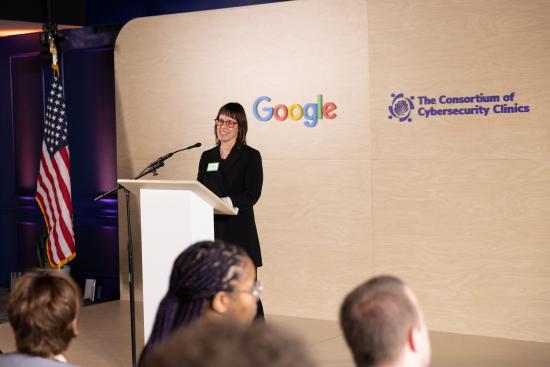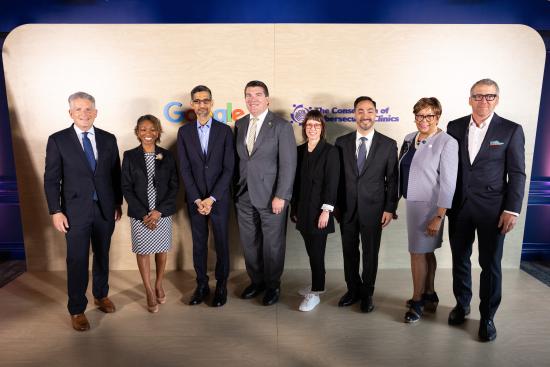UC Berkeley to receive a $2.2 million grant as part of Google’s support of a consortium of cybersecurity clinics.
In 2018, the Center for Long-Term Cybersecurity (CLTC) at the UC Berkeley School of Information launched Citizen Clinic, a first-of-its-kind program that trains students to provide pro bono digital security assistance to public interest organizations with limited resources. Now, as part of a $20 million investment to the Consortium of Cybersecurity Clinics from Google.org, UC Berkeley will receive a $2.2M grant to continue this work at UC Berkeley and support the continued expansion of the consortium.
Founded by UC Berkeley and MIT in 2021, the Consortium of Cybersecurity Clinics serves as a forum for clinicians, trainers, students, and advocates to share knowledge, expand the reach of cybersecurity clinics, and lower the barriers for other institutions to establish their own clinics. CLTC serves as the administrative home of the Consortium.
Similar to clinics in medicine and law, cybersecurity clinics fulfill an important role, as they provide students with hands-on experience and build a diverse pipeline of cybersecurity professionals, while also helping organizations defend themselves and their communities against ransomware, hate groups, and other cyber attacks.
Cybersecurity clinics are included as part of the Biden-Harris Administration’s newly announced National Cyber Workforce and Education Strategy (NCWES), which encourages colleges, universities and state, local, tribal, and territorial governments “to increase the use of hands-on learning opportunities, such as cyber clinics and cyber ranges, to enable students to work directly with organizations in their communities and develop cyber skills in simulated environments.”
On June 22, Sundar Pichai, CEO of Google and Alphabet, Inc., announced the Google Cyber Clinic Fund, a multi-million dollar initiative that aims to help improve the cyber defenses of entities that make up critical public infrastructure, such as local government agencies , hospitals, and schools, while growing a diverse cybersecurity workforce trained in real-world cyber defense strategies. The Fund will help establish new cybersecurity clinics across the United States while strengthening the operations of existing consortium members.
The grant to UC Berkeley will allow the institution to support the consortium’s efforts, including growing its membership, engaging with minority-serving institutions and community colleges, mentoring new clinics, sharing teaching resources, and conducting research across the network of clinics to better serve the public interest.
Carol Christ, UC Berkeley’s Chancellor, lauded the initiative. “We welcome and celebrate Google’s multi-million dollar investment in the cybersecurity clinic model that Berkeley helped pioneer, and in our university’s ongoing work to build and lead the field of cybersecurity for the public good,” Christ said.
“Google’s leadership in expanding the cybersecurity clinic model across the United States will be transformative,” says Ann Cleaveland, co-chair of the consortium and executive director of CLTC. “This dedicated investment in cybersecurity clinics is about civic engagement, hands-on cybersecurity training, propelling new talent into the profession, and defending public-interest organizations. We’re thrilled to be able to scale up the clinic model that was pioneered by the teaching staff at UC Berkeley’s Citizen Clinic and brought to the national level thanks to the co-leadership of MIT and other founding consortium members.”
Google.org will issue an open call for proposals later this year inviting U.S.-based universities, colleges, and community colleges to apply for start-up funding to establish new cybersecurity clinics. In addition, Google will provide students with mentorship opportunities, free access codes to complete the Grow with Google Career Certificate in Cybersecurity, and Google-branded Titan Security Keys, USB devices used for secure two-factor-authentication.
“In an increasingly digital world, cyber attacks are proliferating as a threat to hospitals, schools, utilities, and municipalities responsible for critical urban infrastructure, yet many public agencies and non-profit organizations lack the resources to improve their defenses,” says Professor Larry Susskind, Co-Chair of the Consortium and Director of the MIT Cybersecurity Clinic. “Cybersecurity is just as critical a function as IT and HR, and is needed in all major organizations in every state in the U.S. Google’s generous commitment to support 20 cybersecurity clinics by 2025 will have a huge impact in helping public agencies fend off attackers and build a more inclusive, diverse, and highly skilled talent pipeline for the many critically important cybersecurity jobs of the future.”
Early supporters of the Consortium helped establish it as a national platform. These include the William and Flora Hewlett Foundation, Fidelity Charitable Trustees’ Initiative, Public Interest Technology University Network (PIT-UN), New America, and Craig Newmark Philanthropies’ Cyber Civil Defense initiative.
“I became a fan and early supporter of the clinic model because it really helps people in need of cyber protections while also providing a new workforce of diverse talents and backgrounds with real-world cybersecurity experience,” says Craig Newmark, founder of craigslist and Craig Newmark Philanthropies. “It’s terrific to see Google’s support helping to scale this transformative idea, and to expand the community of people investing in cyber civil defense.”
For more information, email cybersecurityclinics@berkeley.edu.












